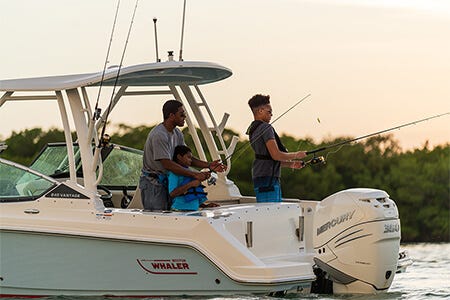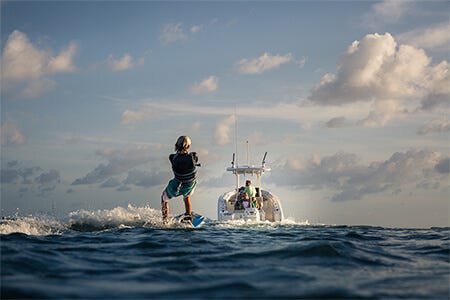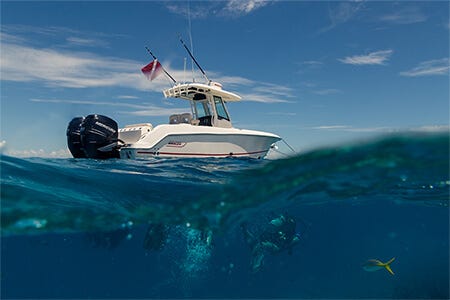

It’s easy to assume that anybody who rents a boat is a new boater (not that there’s anything wrong with that!). But experienced boaters rent boats for all kinds of reasons. Maybe you’re vacationing somewhere too far away to tow your own boat. Maybe you’re between boats, or your boat is in the shop. Maybe you want to take a bigger crew than you can fit in your boat. Maybe you just want to “test drive” a different size or style of boat. Whatever the reason, if you’re an experienced boater or boat owner considering renting a boat, this article is for you.
Contents
Renting Boats Is Different for Experienced Boat Owners
So, why is this article specifically for experienced boaters? Shouldn’t new boaters have the same questions and concerns about renting a boat? Well, yes and no. New boaters should absolutely practice their due diligence and ask questions about the boat they’re renting, the waters they’ll be on and safety equipment and procedures.
But renting for experienced boaters is different in a couple of ways. First, experienced boaters tend to rent boats for more demanding applications and thus to ask more of their rentals. For example, experienced boaters frequently rent boats to fish and snorkel during vacations to the Florida Keys. Doing so safely requires a functional chartplotter and depth sounder, a working VHF radio and suitable ground tackle in good working condition — not to mention a livewell, fishbox and usable swim ladder. New boaters, on the other hand, tend to rent boats for applications that require less in the way of safety and navigational equipment.
Second, experienced boaters tend to already have their boats equipped and outfitted with essentials. For example, your first-aid kit likely stays on the boat in the same location. Maybe you keep your fishing necessities — pliers, bait knife, gloves, fish-handling rag, etc. — on board too. Because you take for granted that those essentials are on board, it’s easy to forget that they probably aren’t on a rental boat. In other words, experienced boaters need to step out of their routines a bit when renting.
Questions to Ask Before Renting a Boat
Before making a rental reservation, you’ll want to ask these questions to make sure the boat will fit your needs and determine what gear you’ll need to supply yourself. Note that these questions are related only to the boat and associated gear. You’ll obviously also want to ask about rental rates, deposit and cancellation policies and any additional charges.
If You’re Renting a Boat to Fish
- What kind of electronics does the boat have? For almost any kind of fishing, you’ll need a working fishfinder. For most kinds, you’ll also want a GPS/chartplotter. If you’re serious about fishing, ask for the brand and model of the electronics. If you’re not familiar with them, you can likely find a user manual online before your trip to shorten your learning curve.
- Does it have a working livewell? If you plan to fish with live bait, make sure the boat has a suitable livewell.
- Does it have a fishbox? If you want to keep fish, you need somewhere to put them. Does the boat have fishboxes you can use, or do you need a cooler or kill bag?
- Does it have a suitable anchor? For many kinds of bottom fishing, you need to be able to anchor securely. In most saltwater situations, that requires far more than a cheap anchor and 50 feet of poly rope. If you plan on bottom fishing, make sure ahead of time the boat has a big enough anchor and plenty of rode for conditions.
- Is a landing net and/or gaff provided? Some renters provide nets/gaffs, but most do not. If not, you’ll need to either bring your own or ask about renting or borrowing.
- Is rental tackle available? If you’re traveling by air, bringing your own rods and reels on vacation can be an expensive hassle. Even in a car, transporting tackle can be a pain. Quality rental tackle can make life much easier.
If you plan on bottom fishing, make sure ahead of time the boat has a big enough anchor and plenty of rode for conditions.
If You’re Renting a Boat for Tow Sports
- Is towing allowed? This seems obvious, but not all rental outfits allow their boats to be used for skiing, wakeboarding or tubing.
- Is a tow rope provided? If so, is it suitable for what you have in mind, or should you bring your own?
- Does the boat have a reasonable swim ladder? If you plan on towing, make sure the boat has a substantial swim ladder.
- Is a skier down flag provided? If the state where you’ll be renting requires the use of skier down flags, make sure one is provided. Even if not legally required, a flag is an important safety measure.
- Are rental tubes/boards/skis available? Like fishing tackle, towables can be difficult to transport by car and impossible by air. Can you save yourself the hassle and rent what you need?
If the state where you’ll be renting requires the use of skier down flags, make sure one is provided.
If You’re Renting a Boat to Snorkel or Dive
- Is a diver down flag provided? Also make sure there’s a suitable way to display it. Most states require that it be flown from the highest part of the boat.
- Does the boat have a good swim ladder? Just like for towing, if you’re going to be in and out of the water a lot, a good ladder is essential.
- Does it have somewhere for tanks? If you plan to SCUBA dive, make sure there’s somewhere you can secure your tanks on board.
Miscellaneous Questions
- Does the boat have a working chartplotter? Even if you’re not fishing, a chartplotter is important on most waters. As with a fishfinder, if the boat’s chartplotter isn’t a brand you’re accustomed to, try to find a manual online. Also, if the chartplotter is the same brand as yours, you may want to bring your own cartography card to use with it.
- Does it have a Bluetooth audio system? Bluetooth is a plus because you can play music from your phone on the boat’s audio system.
- Does it have a 12V outlet for charging phones and other devices? Phones are important communication and navigation tools on the water these days. If there’s a working 12V or USB outlet, bring a compatible charger cable.
- Does it have a second anchor or stick anchor? If you plan to visit a beach or sandbar or raft up, a second anchor can make it much easier. Alternatively, a pole or stake of some kind can be used off the stern on the beach or in shallow water.
- Is any kind of boater’s license or certification required? State boater education and licensing requirements vary widely. Even if not required in your home state, a course, license or certification may be required in the state you're renting in.
- Are pets allowed? If you plan to bring Fido, check first. Some rental outfits allow pets, but many do not.
- Does it have any kind of facilities — a marine head, a portable toilet or even an enclosed area for privacy? If you or your crew will need bathroom facilities or a private changing area, ask ahead of time. In some cases, even if the boat has a head or portable toilet, the rental outfit doesn’t allow it to be used.
- What’s the maximum number of people allowed? If you have a larger group, make sure the rental outfit will allow all of them on the boat. Some have limits that are lower than the boat’s rated capacity.
- How many people does the boat seat when underway? If you plan on bringing more people than there’s seating for, you might want to bring along a bean bag or two.
- Is a cooler provided? Some rental outfits provide a cooler and even ice, meaning there’s no need to haul your own aboard.
- What are the limits on operation? Many rental outfits allow their boats to be operated only in a certain geographical area. If you’re planning to fish offshore or visit a certain island, sandbar or cove make sure it’s allowed. The operation also may not be allowed at certain times of day — often between dusk and dawn.
Even if not required in your home state, a course, license or certification may be required in the state you're renting in.
Things to Check at the Start of Your Boat Rental
You’ve asked all the right questions, picked the best rental boat for you and your crew, and now it’s time to step aboard. Before you leave the dock, though, make sure you check several important items. Yes, the rental outfit should have checked all of this too, but common sense dictates that you do your own inspection.
- Bilge — Is it reasonably dry? A little water in the lowest parts of the bilge is normal on most boats, but there shouldn’t be more than an inch or so anywhere. More than that indicates a leak somewhere and/or a nonfunctional bilge pump.
- Bilge pump — Can you hear it running when you switch it on? If there’s any water in the bilge, you should be able to see it being pumped out.
- Throttle — Does the engine shift smoothly into forward and reverse? Malfunctioning or badly adjusted engine controls are a common issue on rental boats.
- Steering — Bad steering is another common issue. Does the wheel turn smoothly in both directions and does the engine respond as it should?
- Alternator — With the engine(s) running, the voltage meter should read in the range of 13 to 14 volts. If it reads less than 13V, chances are the alternator isn’t charging the batteries.
- Trim and tilt — Does the outboard or outdrive trim and tilt both up and down?
- VHF — If the boat has a VHF radio, does it work as it should? In some areas, this is a critical safety factor.
- Life jackets — If you’re not bringing your own, visually verify that the boat has the correct number and size of life jackets and that they’re in acceptable condition..
- Prop and lower unit — Inspect the prop and lower unit before leaving the dock. Rental outfits deal with a lot of damaged props and lowers from renters running aground. Take your own pictures of any existing damage to the prop or lower unit so you don’t end up paying for it.
- Dock lines — Presumably, the boat will be tied up to a dock at the start of the rental, but sometimes the lines stay on the dock. If you plan to dock anywhere, make sure you have enough dock lines.
- Anchor and rode — Make sure the boat is equipped with a suitable anchor and rode. If you need something special for fishing, like an especially long rode or a reef anchor, make sure you’ve got what was promised.
- Electronics — Do they turn on and function? Does the GPS/chartplotter receive a signal? Does the fishfinder read bottom? Do you have any questions about how to work either?
- Livewell — If you were told the boat had a working livewell, make sure the pump works and that you have the drain plug or standpipe.
- Trouble procedure — Ask what to do if you break down, run out of fuel, get lost etc. Will you call the rental outfit? If so, by phone or by VHF? If by VHF, what channel? Or will you call the Coast Guard, local law enforcement, or a commercial towing service?
What to Bring with You On a Rental Boat
Depending on what you plan to do with your rental boat, how it’s equipped and what is and isn’t included, here are some things to consider bringing that might make your time on the water both safer and more fun. Obviously, not all of these items will be needed on every rental; this list is meant only to get you started thinking. Note that everyday personal gear like appropriate clothing, sunscreen and food and drinks are not included here.
Safety:
- PLB or EPIRB
- Handheld VHF radio as a primary or backup
- First-aid kit
- Children’s life jackets
- Better quality life jackets than those providedSacrificial anodes: Zinc anodes (or sometimes a different type of aluminum) are installed below the waterline to minimize galvanic corrosion of tubes.
Comfort
- Cooler for food and drinks
- Beanbags or folding chairs for extra seating
- Beach umbrella or something similar for extra shade on the boat or shore
- Popup privacy tent for changing
Navigation and Boat Handling
- Binoculars
- Phone charger cable
- Portable charger/power bank for phones
- Extra anchor, sand spike or anchor pin for anchoring at a beach or sandbar
- Fenders for docking or rafting up
- Digital cartography if you happen to already own a card compatible with the boat’s chartplotter
- Manuals for the boat’s electronics (usually available online)
Recreation
- Portable Bluetooth speaker
- Skis, boards, tubes
- Tow rope
- Inflatable beach toys
- Portable swim ladder
- Diver down flag
- Skier down flag
Fishing
- Gaff and/or landing net
- Chum bag
- Reef anchor
- Cooler or kill bag for fish
- Portable baitwell/livewell
- Gaff and/or landing net



